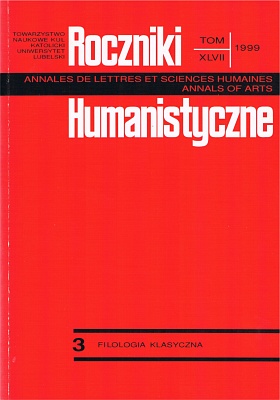Λόγος in the Thought of Parmenides of Elea
Abstract
The paper is a continuation of the studies on the concept λόγος [see the author's articles: Rozwój pojęcia λόγος we wczesnej myśli greckiej. Część I: Epika i liryka (The Development of the λόγος Concept in the Early Greek Thought. Part One: Epics and Lyrics), “Roczniki Humanistyczne”, 44 (1996), fasc. 3, pp. 21-51; Rozwój pojęcia λόγος we wczesnej myśli greckiej. Część II: Idea Logosu u Heraklita z Efezu (The Development of the λόγος Concept in the Early Greek Thought. Part Two: The Idea of λόγος in Heraclitus of Ephesus), “Roczniki Humanistyczne”, 45 (1997), fasc. 3, pp. 5-41; Λόγος we fragmentach Epicharma (Λόγος in Epicharmus' Fragments), “Roczniki Humanistyczne”, 46 (1998), fasc. 3, pp. 5-29]. The main subject matter of our studies is a semantic and philosophical dimension of the word λόγος in the fragments by Parmenides of Elea which have been preserved up to date.
The concept λόγος appears in Parmenides only three times, yet in the light of our analyses it fulfills a very important role. Apart from its use in fragment B 1 (l. 15: μαλακοῖσι λόγοισιν), where in the sense “sweet words ≈ well-formed and clever arguments” it reveals its expressive character. In the remaining two cases we deal with a decidedly rational aspect of the word logos. In fragment B 7 λόγος - “reason” is a superior cognitive faculty; on the one hand, it coordinates the functions of other mental and sense structures, on the other it is ranked an exclusive intellectual power, capable of understanding (by means of “thought”), evaluate (= “distinguish”) and accept the dogma about the only existence of Being, and at the same time to reject the false statement about the existence of non-being (κρῖναι λόγῳ ἔλεγχον − l. 5). Now the truth about Being becomes a principal object of “reliable interpretation (= science)” of the goddess (πιστὸν λόγον − fragment B 8, l. 50). Thus it is in logos that the divine thought about Truth is expressed (νόημα ἀμϕὶς ἀληϑείης), which is and which constitutes the only Being (= “that which is”, [τὸ] ἐόν). It is through goddess's mouth that Parmenides makes it possible to identify three levels of the reality under study: linguistic (λόγος), mental (νόημα, νόος) and ontological (ἀλήϑειη = [τὸ] ἐόν). Therefore the human logos (“reason”), previously endowed with divine knowledge, may evaluate words (i.e. names) from the perspective of an ontological status ascribed to their objects (designates). The reality alone sanctions the truthfulness of that evaluation; here only that which exists (being). Should it be otherwise, that is when the words do not name something that actually exists, then they are only idle names, or rather, deprived of reliability, erroneous views that mortals hold. Therefore they may no longer be regarded as reliable epistemological tools. Such being the case, the best solution is to trust the message (λόγος ≈ μῦϑος) of the goddess. She appears to be both the only source of knowledge about being, and a reliable guide on the way to Truth. Without that aid, the human logos − “reason” would be totally helpless: without a revealed knowledge, for it is only when that knowledge has been acquired that it can set to analyze the mortals' views and their opinions about reality (δόξαι βροτεῖαι).
One of the few “divine” disciples, who have been honoured with the knowledge of the truth, is the poet himself, Parmenides. As an exceptionally able student, he shows us that in order for the process of cognition to succeed, one should employ, both on the way of Truth and falsehood (= non-truth), an appropriate research instrument, i.e. logos. It is by means of that instrument that the young philosopher does not concentrate on the illusory phenomena, but reaches into a more profound sphere, into the very foundations of reality, for he can properly interpret the message (= science) that has been revealed to him. Therefore in order to gain a real knowledge about Being, everybody must behave like the poet-philosopher does, in other words, his own reason (λόγος), must become absorbed in the story (μῦϑος) and thought (νόημα) of the goddess. It must absorb her logos (λόγος), and only then did he decide (κρῖναι) to reject (ἔλεγχος) non-being and accept the true Being (τὸ ἐόν = ἀλήϑεια). In this approach to logos (i.e. “reason”, together with its inferior intellectual faculties), as the only guarantee of the final cognitive success, one should find − as we think − the most important convergence in the thought of Parmenides and Heraclitus of Ephesus. The question, however, to what extent it is a direct influence of the Ephesian, an to what extent it is a creative continuation of his solutions, must remain without an answer, as our evidence is insufficient.
Copyright (c) 1999 Roczniki Humanistyczne

This work is licensed under a Creative Commons Attribution-NonCommercial-NoDerivatives 4.0 International License.





